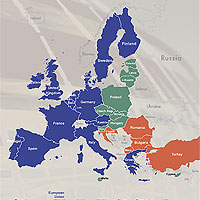Moscow Helsinki Group chairman regrets that Nobel Peace Prize went to EU

(Interfax – October 12, 2012) Lyudmila Alekseyeva, the head of the Moscow Helsinki Group, believes that the decision to award the 2012 Nobel Peace Prize to the European Union was wrong.
“If it were awarded to political prisoners in Iran, it would be clearer to me. I wonder how they will photograph the EU as the Nobel Prize winner and how they will give this prize to the EU,” Alekseyeva told Interfax on Friday.
Alekseyeva and another Russian human rights activist, Svetlana Gannushkina, were among the persons nominated for the Nobel Peace Prize 2012.
“Don’t think I am saying this because I am hurt. It’s a comment from a sensible person. First they give the Nobel Prize to Obama, then to the European Union, and public figures in all countries are getting bored. Who’s next? Maybe the Shanghai Cooperation Organization?” Alekseyeva said.
Alekseyeva said it would have been right to give the Nobel Prize to some Russian human rights activist or public figure.
“Our movement is almost half a century old. It developed under very difficult conditions. The Andrei Sakharov Award [awarded by the European Parliament] was once colossal moral support. The Norwegian Nobel Committee could have played the same role. Unfortunately, it didn’t,” Alekseyeva said.
Svetlana Gannushkina, the head of the Civil Assistance Committee, who was nominated for the Nobel Peace Prize in 2012 along with Alekseyeva, also said she is disappointed with the decision.
“It’s just laughable,” she told Interfax at the 2012 Nobel Peace Prize award ceremony.
“The award has been depersonalized to such an extent. It has been given to a state, bureaucratic structure. The Nobel Committee could have defended the principles of peace and democracy if it had awarded the prize to those who have worked in this sphere for many years and now need support,” Gannushkina told Interfax.
Gannushkina said she would be glad if the prize had gone to Belarusian human rights activist Ales Belyatsky.
“I am disappointed with today’s decision. It indicates some sort of impotence. I would very much like today’s decision to stir Europe. The EU authorities and international structures have been fairly indifferent to issues relating to peace, democracy, and human rights over the past years. They need to be shaken somehow,” Gannushkina said.
